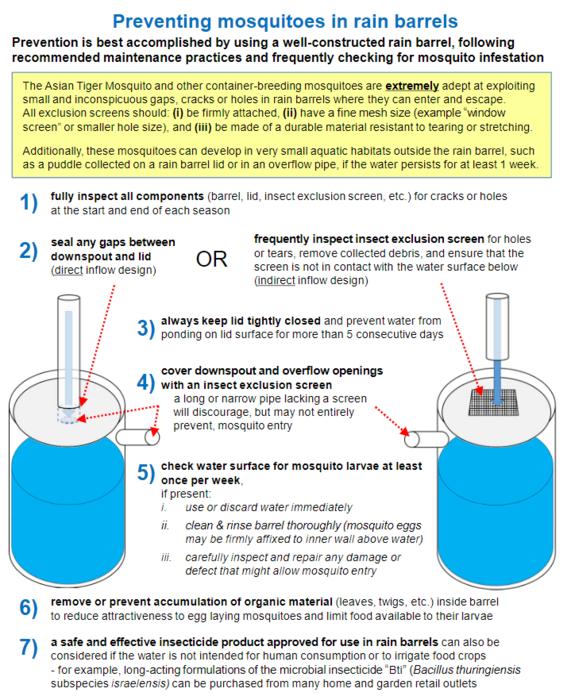
Rain barrels have emerged as an eco-friendly solution to conservation efforts by capturing rainwater for irrigation and reducing stormwater runoff. With the growing awareness of environmental sustainability, homeowners increasingly embrace this green technology, contributing to significant water savings while mitigating urban flooding. However, these beneficial structures can inadvertently create breeding grounds for mosquitoes, which thrive in standing water. Unattended rain barrels may convert into habitats for juvenile mosquitoes, posing potential public health risks.
In a recent research initiative led by scientists at the University of Illinois, the relationship between residential rain barrels and mosquito presence was carefully scrutinized. The investigation surveyed 115 rain barrels across 53 households in Champaign County, Illinois, during the summer months of 2016. The study aimed to assess the prevalence of mosquitoes in these rainwater collection systems and identify effective preventative strategies for homeowners. Surprisingly, the survey revealed that over 50% of the barrels surveyed were found to harbor mosquitoes, emphasizing the need for a deeper understanding of how to manage these structures effectively.
Mosquitoes are more than just a nuisance; they significantly contribute to the transmission of numerous diseases, including the West Nile virus, posing serious threats to human health. Researchers pointed out that human-made habitats such as rain barrels are abundant in urban settings, making it crucial to manage these environments to minimize mosquito populations. Recognizing the dual nature of rain barrels, scientists sought to balance their benefits with the risks they pose to public health due to the presence of mosquito larvae.
The study’s principal investigator, Brian Allan, expressed concerns regarding the lack of research on rain barrels as possible mosquito habitats. While many homeowners utilize these barrels as sustainable gardening aids, there has been insufficient attention paid to their management, particularly regarding mosquito prevention. As the researchers delved into their evaluation, they highlighted the necessity of protective measures that could be easily implemented by everyday homeowners.
The research team’s findings underscored that certain preventive strategies significantly reduce the chance of mosquito occurrence in rain barrels. The statistical analysis demonstrated that barrels covered with mesh lids experienced lower mosquito infestations. Alluding to common practices in vector control, the study suggested that treatment with mosquito prevention methods, such as the bacterial insecticide Bacillus thuringiensis israelensis (Bti), chlorine, or introducing natural predators like goldfish, can mitigate the standing water problems often associated with rain barrels.
Additionally, homeowners’ awareness of mosquito prevention techniques proved an essential aspect of the study. While many participants recognized short-term measures, such as emptying their barrels, few were knowledgeable about longer-term solutions that could safeguard against mosquito habitation. This lack of awareness presents a gap that public health initiatives can address through education and outreach programs focused on best practices for rain barrel management.
The researchers also considered the vital role of community outreach in forming knowledgeable homeowners capable of maintaining their rain barrels effectively. Educational initiatives by local authorities, including public health departments and mosquito control agencies, can bridge the knowledge gap and empower households to adopt preventive measures. The interplay of environmental sustainability and public health through coordinated efforts presents a promising direction for managing rain barrels without compromising their pest control.
In light of their research findings, the Illinois team believes that equipping current and prospective homeowners with actionable insights can help them deploy effective strategies against mosquito breeding. The goal is to elevate awareness regarding the critical balance between conserving water and ensuring public health safety. Accessible resources and community programs tailored to local settings can also facilitate proper barrel maintenance.
With the risks strongly associated with untreated rain barrels established, the researchers found a compelling reason to emphasize their recommendations for preventative measures. Educating homeowners on mosquito-proofing rain barrels becomes essential not only for mitigating the nuisance of biting insects but for reducing the risks associated with vector-borne diseases. As community awareness rises regarding the importance of taking proactive measures against mosquito reproduction, the benefits of rain barrels can be maximized without endangering public health.
Furthermore, community engagement will likely reinforce sustainable practices while safeguarding the health of local populations. By integrating mosquito management into discussions around water conservation, a holistic approach can emerge, urging residents to be diligent in their upkeep of rain barrels. The ultimate aim is to cultivate healthy communities underpinned by environmentally beneficial practices.
In conclusion, rain barrels represent a potent tool in water conservation, yet they carry the potential for mosquito proliferation if not properly maintained. The Illinois researchers underline the significance of adhering to installation best practices, monitoring hygiene, and being educated on prevention strategies. By coupling sustainable practices with ongoing education, there exists an opportunity for households to become not only custodians of environmental health but champions of public health as well.
As discussions around rainwater harvesting grow, it is clear that a community-centered approach to management will benefit both the environment and the health of residents. The future of rainwater conservation lies in collaboration, responsibility, and the judicious implementation of preventative measures, ensuring that homeowners, communities, and ecosystems thrive in harmony.
Subject of Research: Evaluating vector mosquito occurrence in residential rain barrels in central Illinois
Article Title: Evaluating vector mosquito occurrence in residential rain barrels in central Illinois
News Publication Date: 21-Feb-2025
Web References: Stormwater and Mosquito Control Project page
References: Journal of Medical Entomology
Image Credits: Andrew Mackay
Keywords: Mosquitoes, Disease prevention, Environmental education, Entomology, Water conservation, Environmental sciences
Tags: eco-friendly rainwater collection systemseffective rain barrel maintenance tipsenvironmental sustainability and rain barrelsmosquito control techniques for homeownerspublic health risks of mosquitoesrain barrel benefits for water conservationrainwater harvesting and public healthreducing mosquito breeding in rain barrelsresidential mosquito presence studiessustainable water management practicesUniversity of Illinois mosquito research initiativeurban flooding prevention strategies





